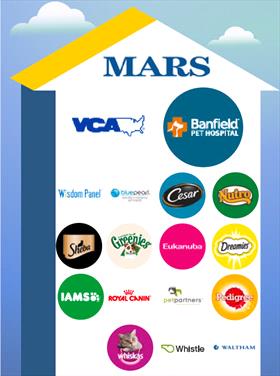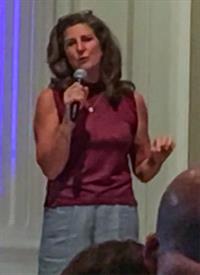

Graphic by Tamara Rees
Mars Inc.‘s pet-related brands include veterinary hospitals and dog and cat foods.
From an hour's conversation with an antitrust investigator at the U.S. Federal Trade Commission, Dr. Dan Cole could tell that the agency would not be taking a broad view on the combining of the nation's largest veterinary practice owners, Mars Inc. and VCA Inc.
"Most of their questions pertained to specialty medicine, pricing and competition," Cole recounted. "They also needed to know how referrals work. They asked nearly nothing about GP [general practice] issues ..."
Cole, a relief veterinarian in Vermont who entered the profession five years ago, called the FTC to share his worries. He believes that consolidation will "likely harm" competition in general-practice medicine, owing to corporations' ability to outbid individuals on practices for sale, and to leverage economies of scale, such as by obtaining bulk discounts on drugs, equipment and supplies.
The investigator listened politely, Cole said. But in the FTC decision released Aug. 30 on how Mars can acquire VCA without violating antitrust law, nothing pertains to general practice. A consent order to which Mars agreed requires the company to sell 12 hospitals, all emergency and/or specialty referral hospitals in markets where keeping those practices would give Mars a local monopoly.
That leaves Mars with some 2,000 hospitals in the United States and Canada still in hand, nearly double the number it had before acquiring VCA. Pamela Mars-Wright, great-granddaughter of the American business magnate Franklin C. Mars, said on the day that the VCA purchase closed that the company, which is best known for making candy, now counts 45,000 employees in pet care.
"We're a pretty big company, and one-third of our people work on the veterinary side," she said in a speech Sept. 12 at an industry gathering in Portland, Oregon.
The collective weight of Mars-owned veterinary practices — which operate under the brand names Banfield Pet Hospitals, BluePearl, Pet Partners and now, VCA — leaves some independent practitioners wondering about the worth of the FTC's antitrust remedy.
"We may as well not have antitrust laws any more," Dr. Joseph Griffioen, owner of two clinics in Iowa, said on a message board of the Veterinary Information Network, an online community for the profession. "12 clinics? As if that will make a difference."
Dr. Greg Nutt, a practice owner in Georgia, had a similar reaction. "[N]ot even a drop in the bucket," he wrote. "How are these 12 clinics going to change anything?"
If some veterinarians were surprised by the FTC's approach, followers of antitrust policy in the United States weren't. Chris Sagers, a law professor at Cleveland State University and member of the American Antitrust Institute advisory board, predicted before the FTC announcement that the agency would allow the deal to happen, subject to the divestiture of a handful of individual practices.
"These are the kinds of deals that worry me the most," Sagers said in an interview. "I think there are a number of major failings in merger law right now, but if there's one really big one, it's that we look at deals and patterns of consolidation very microscopically; very transactionally. The agencies have to be able to convince the court that this specific transaction in a very specific way hurts somebody."
Because the market for primary-care veterinary services is very local, with most pet owners traveling 10 or 15 miles at most to visit a clinic, he anticipated that regulators' analysis on market competition likewise would be on a hyper-local scale.
That turned out to be the case. The order to divest affects emergency and/or specialty BluePearl or VCA hospitals in Gilbert, Arizona; Elk Grove Village, Illinois; Mission, Kansas; Gaithersburg, Maryland; Yonkers, New York; Tigard, Oregon; Corpus Christi, Texas; San Antonio, Texas; Vienna, Virginia; Issaquah, Washington; Lynwood, Washington; and Vancouver, Washington.
Sagers said after the FTC announcement, "This whole thing is just so drearily predictable."
Effectiveness of divestiture questioned
Whether the divestitures will preserve competition in the long run is an open question. The effectiveness of FTC remedies, including divestiture, to support competition has been a point of lively discussion in the antitrust community.
In the book "Mergers, Merger Control and Remedies: A Retrospective Analysis of U.S. Policy" published in 2015, Northeastern University economist John Kwoka reviewed about 50 studies on the effects of specific mergers. He found that most of the studied mergers resulted in higher prices, and that government remedies to preserve competition were largely ineffective — more so in recent years.
Pathway deal struck in two hours
People in the FTC have criticized Kwoka's work, saying that "serious deficiencies" in his evidence and empirical methods "undermine the basis for [his] conclusions." In January, the agency released its own analysis of merger remedies applied from 2006 to 2012. It found, among other things, that "all divestitures involving an ongoing business succeeded." The agency counted as a success those cases in which assets were transferred to approved buyers and in which the "vast majority" of divested assets stayed in business in the relevant markets. The study drew criticism of its own for its modest measure of success.
The view of Kwoka, who worked at the FTC and U.S. Department of Justice Antitrust Division during the 1970s and 1980s, is unchanged.
"The reality is that divestitures on the whole have not prevented price increases," he said in an interview. "...That's not to say that they all fail. There are some that are truly dreadful and some that work perfectly fine. Now I'm trying to identify the characteristics of those that work and those that don't."
Kwoka has not studied the veterinary economy but said the pattern of consolidation is familiar. "This looks like a trend that we've seen in a lot of other sectors," he said, citing supermarkets, drug stores and car-rental operations as examples.
The three companies selected to acquire the 12 Mars/VCA hospitals are themselves consolidators. The FTC requirement to name buyers that have the wherewithal to compete with the large corporations would seem to require the resources of other sizable businesses.
In fact, Kwoka wondered why three buyers were selected rather than one. "If there's some magic to the chain-store sauce, if they do something that gives them an inside track to the market, you might really want to make sure that all the divested assets go to one chain to make it larger," he said. "Scattering it among three ... kind of guarantees the greater dominance of the merged entity."
How Mars came to propose the three buyers is unclear. The company declined to answer questions about the process.
Who gets the divested clinics
The largest and most established of the three acquirers is National Veterinary Associates, or NVA, which describes itself as "the largest private owner of freestanding veterinary hospitals in the United States." According to its website, NVA owns 424 companion animal veterinary hospitals and boarding facilities in the United States and Canada, with more than 900 veterinarians in its workforce of more than 5,500. NVA was founded by a veterinarian, Dr. Stanley Creighton, who served as its CEO from 1996 to 2009. The president and CEO now is Gregory Hartmann, who previously worked for DaVita Inc., a national provider of renal dialysis services. The company did not respond to a request for an interview.
The other two acquirers were founded in 2012.
PetVet Care Centers, based in Westport, Connecticut, lists 104 locations in 21 states. The business was established by Gino Volpacchio, its chairman and CEO. Volpacchio previously was president and CEO of another veterinary chain, Healthy Pet Corp., that merged with VCA in 2007. At that time, Healthy Pet operated 44 animal hospitals. Volpacchio did not return a telephone call seeking comment.
The third acquirer is Pathway, a veterinary management company in Austin, Texas. According to Pathway CEO Dr. Stephen Hadley, the company soon will own 130 practices, including the pending acquisition of an operation with 50 locations. Pathway's founders are Dr. Jasen Trautwein, a veterinarian, and Shawn McVey, a practice consultant. Morgan Stanley Global Private Equity made a majority investment in Pathway in 2016.
Hadley and three other men on Pathway's 10-person management team have a combined 50 years working for VCA and/or BluePearl.
Are such links a potential conflict of interest? An FTC spokeswoman said the agency does not comment on specifics of the case beyond what it has posted publicly. Asked how the agency generally looks upon ties between a Company X that acquires divested assets and divesting companies A and B, the FTC replied:
"The connection between X’s management team and A or B might be of concern to the FTC, for example, if any of the people at X still had an ongoing business relationship with A or B, or had pensions or other financial interests that depended on the success of A or B.
"On the other hand, if there are no such existing ties, the experience of X’s management team in the relevant market might be a factor that would support the ability of the Company X to operate the divested business in a way that would maintain the viability and competitiveness of the business."
Hadley spent 12 years at VCA and had a stint at BluePearl before joining Pathway. He said he believes "absolutely" that relationships between Pathway managers, VCA and BluePearl were a factor in Pathway being invited to take part in the deal.
"We had a track record," he said. "At the end of the day, they knew our capabilities, so it wasn't just selling to the highest bidder — although I'm sure the pricing was very competitive between the three buyers. It was just a long history with the three players. VCA has a long history with the leadership of NVA. VCA has a long history with the leadership of PetVet. And obviously with me and other members of the Pathway leadership team. So there was just a high degree of trust."
He added that he has no financial connections with VCA or BluePearl. "We're competitors, no doubt about that," he said. "We compete for hospital and support office employees, we compete for field managers, we compete for doctors. We're friendly competitors, but we don't profit from each other."
'Our job is not to transform markets'
On the broader question of whether widespread chain ownership and market dominance by a few entities is a healthy course, FTC leaders and observers say U.S. policy is to let the market determine winners and losers.
"The [regulatory] agencies don't second-guess or judge business practices," Kwoka explained. "If it turns out to be a bad business to operate chains of veterinary practices rather than to own them one at a time, then the chains won't do well or will fail as a matter of their capabilities in the market. The agencies don't get in the business of whether that's wise or profitable or efficient; they let the market figure that out."
In a speech in September 2016, then-FTC Chairwoman Edith Ramirez said: "Our role is by necessity a limited one. ... Our job is not to transform markets; we must take them as they are."
She continued: "The fact that there may be fewer firms today in certain sectors than in years past does not necessarily mean that these sectors are any less competitive from a consumer welfare perspective.
"Nor can we simply decry an increase in the presence of large firms — or even dominant ones — merely because they are big or have a high market share .... In many cases, being big is the consequence of being better than rivals at offering customers what they want. We are rightly hesitant to view success, and by extension size, with automatic suspicion. Indeed, large firms can have scale economies and other efficiencies that are beneficial for consumers."
Pathway CEO Hadley said he believes that in veterinary practice, "There will always be independents. There's still plenty of opportunity," he said, citing in particular a lack of veterinary specialty practices in many parts of the country.
He also said that consolidators exist in enough numbers such that "there are still options for the consumers."
Mars-Wright, speaking at the Banfield Pet Healthcare Industry Summit on Sept. 12, said she views her family's deepening involvement in veterinary medicine as "a huge responsibility." She expressed a desire to elevate the profession. "How do we raise what veterinarians do to the level that is valued like a human doctor?" she asked.

VIN News Service photo
Pamela Mars-Wright, speaking at a pet health-care industry gathering in Portland, Oregon, this month, expressed a love for animals and a desire to elevate the veterinary profession.
Defending the role of corporations in the profession, Mars-Wright said, "The Mayo Clinic is also corporate. A lot of people would happily go to the Mayo Clinic." (Mayo is a not-for-profit corporation.) "I think corporate medicine can do really great things," she continued. "We can be a model for what the rest of the world would like to have in terms of pet health [and] veterinarians' health."
Referring to Mars' status as a privately held company, Mars-Wright said the family owners don't "have to worry about whether ... we made the quarterly results. We have the opportunity to do the things we're passionate about."
She called her three Maine coon cats "my four-legged children" and described the Mars family as "huge pet lovers."
"It's not something that's just a business for us; it's personal for us," she said. "All of us feel that if we make life better for pets, we make life better for the people with pets."
Exactly what proportion of U.S. veterinary practices now are a part of Mars is unclear; no one has a firm handle on the total number of practices. Brakke Consulting, an animal health management consulting firm, estimates 28,000 to 30,000. That would put Mars's share at 6 to 7 percent — far from a majority. Still, it's not premature to consider where it will all end, said Kwoka, the Northeastern economist.
"In the view of some, changes like this foreshadow competition problems down the road. The incipiency doctrine would say don't wait until it all hits the fan before you take action," he said. "... [Mars and VCA] are the two largest chain firms, and somebody might take a harder look at it with this in mind. But the focus on narrow product lines continues to be the guiding beacon to policy."
To date, enough players remain in the market that veterinarians who prefer to work at independent practices have choices. Dr. Chris Bailey took a job at a hospital on the understanding that it would remain independent. When it sold to Pathway a year later, Bailey left.
"I don't have an interest in helping a private practice transition to a corporate practice. I'm young and flexible enough that I was able to just make a decision to step away from that," said Bailey, who graduated from veterinary school in 2014 and practices emergency medicine in Oregon.
"I think the future of veterinary medicine is not well served by consolidation," he said. "You look at what's happening on the human health care side of things. I don't think anyone can reasonably argue that it's patient-centric care or that it's oriented towards taking care of the employees."
Despite his passion for independent ownership and actions to support it, Bailey anticipates that he someday will work for a corporation, as more practices go that route.
Feb. 24, 2023: A hotlink to submitted comments has been removed from this article because the link is no longer viable.